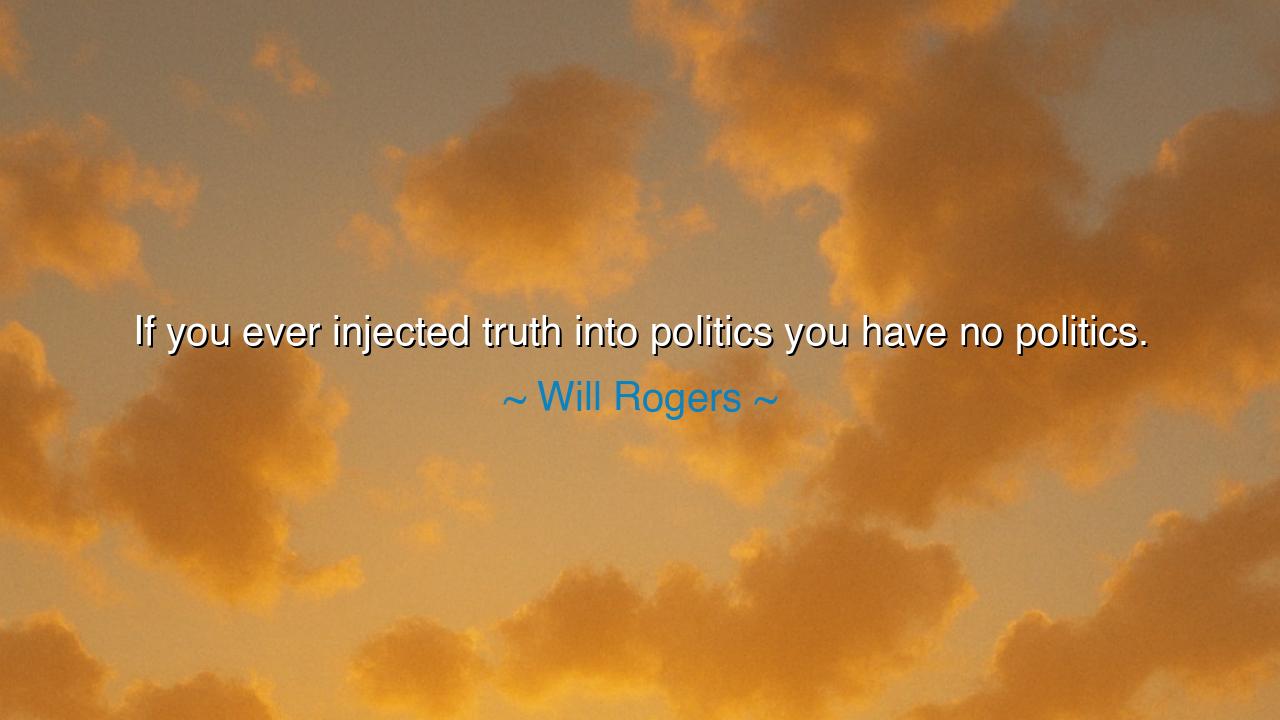
If you ever injected truth into politics you have no politics.






The words of Will Rogers—“If you ever injected truth into politics you have no politics”—cut with the sharpness of both humor and sorrow. For Rogers, the great American satirist, saw with piercing eyes the games of politicians: how they wrapped their ambitions in rhetoric, how they cloaked their failures with excuses, and how they bent words like reeds to please the winds of power. His saying, though jesting, carries the sting of reality: politics, as it is often practiced, survives not by truth but by illusion, compromise, and the art of deception. Inject truth into its veins, and the theater collapses, for truth leaves no room for masks.
This paradox has ancient roots. In the courts of kings and emperors, truth-tellers were rare, and those who dared speak honestly often paid with their lives. The court jester could sometimes slip truth into laughter, but seldom could the statesman speak plainly without peril. Plato himself lamented that the true philosopher, devoted to truth, would be destroyed in the public arena, for politics thrives on persuasion more than reality. Thus Rogers’ quip is not merely an observation of modern politics—it is the unveiling of a truth as old as civilization itself.
History offers us many examples. Consider the fate of Socrates in Athens. He refused to flatter, refused to play the games of rhetoric, and demanded truth above all. For this, the city condemned him to drink the hemlock. Athens, birthplace of democracy, could not bear the nakedness of truth within its politics. Or reflect on Abraham Lincoln, whose honesty earned him the title “Honest Abe.” Though revered today, in his own time he faced relentless attack, for truth spoken in the political arena is often unwelcome, and even dangerous. Rogers’ words echo in these lives: politics resists truth because truth exposes, while politics prefers to conceal.
Yet the humor of Rogers carries a deeper wisdom. For though he mocked, he did not despise. He understood that politics, being made by men, carries the flaws of men—fear, ambition, pride. But he also knew that laughter and satire could pierce the armor of pretense, reminding the people that politics without truth is but a hollow play. His saying is a challenge: if politics cannot endure truth, then perhaps it must be remade, so that truth and politics are not enemies but companions.
But we must not think politics alone is guilty. In our daily lives, how often do we hide the truth beneath diplomacy, smoothing over discomfort with half-lies, practicing our own small politics in family and work? Rogers’ wisdom extends to all: truth is dangerous because it is uncompromising. Lies and distortions lubricate human affairs, while truth is hard, sharp, and often painful. Yet without truth, there is no integrity, no justice, no real peace—only the illusion of them.
The lesson is clear: though politics may resist truth, we must not. In our dealings, in our speech, in our choices, we must dare to inject truth, even if it costs us comfort, favor, or advantage. If politics as a system falters before truth, then let us as individuals be the ones who stand as bearers of it, refusing to join the dance of deception. For every society that has ever been lifted from corruption has been raised up by men and women who chose truth over illusion, even when the world mocked them.
Therefore, O seeker, remember Rogers’ wisdom: truth and politics are uneasy companions, but truth must remain your guide. Do not let the world’s games seduce you into falsehood. Be as the lone voice in the crowd, the one who speaks what others fear to hear. For while politics may crumble before truth, the soul that clings to truth will stand unshaken, and in time, even nations will be reshaped by the courage of those who refused to bend.






KKKhanh Khanh
I find this quote to be a bit disillusioning, but also realistic. It implies that honesty in politics might eliminate the very thing that makes politics 'work'—manipulation and strategy. However, I wonder if we’ve reached a point where the public could accept more truth in politics, even if it meant less traditional politicking. Would it be worth the sacrifice, or would it cause more harm than good?
NAThu Tran Ngoc Anh
This quote makes me wonder if politics is inherently deceptive. If truth were prioritized, would the system even function? It suggests that the nature of politics involves compromise, which often means bending the truth. But is that necessarily a bad thing? Can politics still serve the public good while being grounded in truth, or is this a contradiction by nature?
LBLe Bao
Will Rogers' words seem quite harsh, but there’s definitely a lot of truth in them. Politics seems to be built on negotiation and often deception, with the 'truth' getting lost in the process. Can a politician even survive if they were to speak the truth all the time, given the complex nature of political alliances and public opinion? Is it possible for truth to be part of politics without losing everything else?
MT10CT2-32- Huynh Minh Tam
This quote really hits at the heart of political cynicism. It suggests that politics, as we know it, often thrives on manipulation and half-truths. If truth were injected into the equation, there would be no room for the typical strategies and compromises. Do you think this reflects the reality of modern politics, or is it an exaggeration? Is there a way to bring truth into politics without disrupting the system?